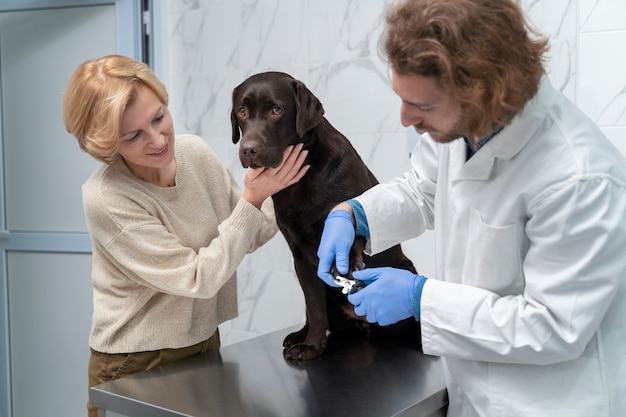Managing Pet Cancer in Humid South Florida Summers: Comfort & Care Tips


Managing Pet Cancer in Humid South Florida Summers: Comfort & Care Tips
Caring for a pet diagnosed with cancer is always challenging, but the unique climate of South Florida brings added considerations during the summer months. As temperatures and humidity soar across Coral Springs and surrounding communities, the risks to pets with cancer increase. At Veterinary Cancer Health, located at 4101 Turtle Creek Drive, Coral Springs, FL, our oncology-focused veterinary professionals understand the delicate balance between managing your pet’s cancer and protecting them from the stress of heat and humidity. This blog explores how South Florida’s summer climate can affect pets undergoing cancer treatment, highlights signs of heat-related complications, and offers practical, veterinary-approved summer comfort tips for pets. Whether you’re seeking advanced cancer care in Coral Springs or searching for a trusted “oncology vet near me,” our guidance will help ensure your pet’s summer is as safe and comfortable as possible.
If you are navigating a recent diagnosis or seeking more information on comprehensive cancer diagnosis and staging evaluations for pets, our team is here to support you every step of the way.
Recognizing Summer-Related Challenges for Pets with Cancer
Common Signs of Heat Stress and Cancer-Related Discomfort
Pets facing a cancer diagnosis may already be more vulnerable to environmental stressors. High humidity and soaring temperatures can quickly exacerbate existing symptoms or result in new complications, especially when a pet is undergoing chemotherapy, targeted therapy, or advanced diagnostic procedures. Signs that your pet may be struggling during the summer include excessive panting that doesn’t resolve, persistent lethargy, unusually rapid breathing, drooling, or seeking out cool surfaces more frequently than usual. Additional warning signs are decreased appetite, vomiting, diarrhea, or a noticeable change in gum color such as pale or bright red gums.
Cancer itself or its treatments can further suppress a pet’s immune system, making them less resilient during heat waves. If your dog or cat is suddenly less interested in walks, play, or social interaction, or if you notice increased weakness or stumbling, these can also be subtle indicators of distress. For pets with tumors affecting the respiratory system or those undergoing certain therapies, even mild heat stress may result in labored breathing or coughing.
When Summer Exacerbates Underlying Cancer Symptoms
The combination of cancer and the South Florida climate means pet owners must remain vigilant, especially when daily highs reach into the nineties with high humidity. Pets receiving chemotherapy, immunotherapy, or other advanced treatments may experience side effects such as dehydration, gastrointestinal upset, or decreased stamina. These effects can be magnified by hot weather, making it harder for your pet to regulate their body temperature.
In some cases, medications used in cancer care can alter how pets respond to heat, or increase their risk for sun sensitivity and dehydration. Pets with advanced cancer or those receiving palliative care are particularly at risk during the summer season. Recognizing and responding to these environmental triggers can help you provide the highest level of comfort for your beloved companion.
Understanding Why Summer Conditions Affect Cancer Care in South Florida
How Humidity and Heat Impact Pets Undergoing Cancer Treatments
The physiology of dogs and cats makes them less efficient at cooling down than humans; they rely primarily on panting and limited sweat glands in their paw pads. When humidity is high, panting becomes less effective, trapping heat in their bodies and raising the risk of overheating. Pets with cancer may have additional risk factors, such as reduced activity, changes in blood cell counts, or impaired organ function from either the disease or treatment side effects.
In South Florida, the risk of heat stroke and dehydration is especially pronounced for pets with compromised immune systems. Treatments like chemotherapy or targeted therapy can sometimes reduce a pet’s ability to compensate for environmental stress, making it crucial to monitor them more closely during the hottest months. Even a brief period outside can lead to rapid overheating, particularly for brachycephalic breeds (such as Bulldogs or Persians), older pets, or those with thick coats.
The Role of Cancer Type and Treatment Modality
Certain cancers, such as those affecting the lungs or heart, can impair a pet’s ability to tolerate heat even further. For example, pets with lymphoma or tumors near the respiratory tract may have reduced oxygen exchange, making hot, humid air especially taxing. Chemotherapy and immunotherapy, while life-extending, can also temporarily weaken a pet’s resilience, making supportive summer comfort tips for pets essential.
Our team of veterinary oncologists at Veterinary Cancer Health is experienced in adjusting treatment recommendations for cancer care in Coral Springs and surrounding communities, ensuring each pet receives individualized guidance that accounts for both their medical condition and the unique South Florida environment.
Professional Cancer Care and What to Expect During Summer Months
Advanced Veterinary Cancer Treatments in Coral Springs
Veterinary Cancer Health provides a comprehensive array of advanced oncology services, including customized chemotherapy and medical treatments for pets with cancer, immunotherapies, targeted therapies, and ongoing cancer care monitoring. During the summer, our veterinary team carefully evaluates each patient’s hydration status, energy levels, and overall comfort before recommending or adjusting any treatment protocol.
Your pet’s treatment plan may include scheduled recheck exams to monitor for side effects that could be worsened by heat, as well as regular bloodwork to track hydration and organ function. In some cases, therapies may be adjusted temporarily to minimize outdoor exposure or to allow for additional supportive care. Our customized treatment plans for dogs and cats diagnosed with cancer take into consideration not only the type and stage of cancer but also the impact of the local climate on your pet’s wellbeing.
Supportive Care and Symptom Management
Supportive care is vital for maintaining quality of life during cancer treatment, especially in the summer. This can involve fluid therapy to prevent dehydration, anti-nausea medications to reduce gastrointestinal upset, and pain management services for dogs and cats with cancer. For pets experiencing advanced disease, palliative and end-of-life care to ensure pet comfort during advanced cancer is available; our veterinary professionals work closely with families to prioritize comfort and dignity.
Monitoring your pet’s response to treatment is a collaborative process. Our ongoing cancer care and monitoring services for pets undergoing treatment allow us to make timely adjustments, particularly during periods of extreme weather. We encourage open communication with your veterinary oncologist regarding any concerns about your pet’s comfort or behavior during the summer.
Practical Home Care and Summer Comfort Tips for Pets with Cancer
Creating a Cool, Restful Environment
To help your pet stay comfortable throughout the South Florida summer, consider keeping your home air-conditioned and offering easily accessible cool, shaded areas for rest. Some pet owners use cooling mats or damp towels; others run fans in rooms where their pet prefers to relax. Making fresh water available at all times is essential, and replacing it frequently encourages drinking. Avoiding walks or outdoor activities during peak heat, typically from late morning through early evening, helps reduce the risk of overheating.
If your pet enjoys outdoor time, restrict activity to early morning or late evening when temperatures are lower and humidity may be slightly less oppressive. Watch for surfaces that can become dangerously hot, such as asphalt or concrete, which can burn sensitive paw pads and contribute to body heat retention. For pets with limited mobility or advanced cancer, providing soft bedding and minimizing the need to move between locations can further reduce stress.
Nutrition, Grooming, and Medication Adjustments
Proper nutrition, tailored to your pet’s current treatment plan, supports energy and resilience during the summer. Some pets benefit from smaller, more frequent meals, especially if their appetite is affected by heat or medication. Grooming, such as regular brushing to remove excess undercoat, can help pets better regulate their body temperature, but avoid shaving unless advised by your veterinarian, as fur also protects against sunburn.
Discuss any medication adjustments with your oncology veterinarian, particularly if your pet is on medications that can increase sun sensitivity or dehydration risk. Never make changes to prescribed treatments without professional guidance.
Emotional Comfort and Monitoring
Cancer treatment can be stressful for pets, and the discomfort of heat may amplify anxiety or restlessness. Providing extra reassurance, spending quiet time together indoors, and maintaining a familiar routine can help your pet feel secure. Frequent observation is key; noting even subtle changes in behavior, eating, or energy can allow for early intervention if problems arise.
When to Seek Veterinary Oncology Care During South Florida Summers
Recognizing an Emergency or the Need for Professional Help
Immediate veterinary attention is necessary if your pet exhibits signs of heatstroke, which can include rapid or noisy breathing, collapse, seizures, vomiting, or a rectal temperature above 104°F. Other urgent symptoms are persistent vomiting or diarrhea, refusal to eat or drink for more than 24 hours, uncontrolled pain, or sudden swelling or discharge from tumors.
For pets already receiving cancer care in Coral Springs, a sudden decline in energy, unexplained bleeding, or dramatic changes in breathing or gum color should prompt a call to your veterinary oncologist. Even mild symptoms can escalate quickly in the heat, so erring on the side of caution is always recommended.
Our team at Veterinary Cancer Health is equipped to handle complex cases and collaborate with your primary care veterinarian to ensure seamless, specialty-level support. If you are searching for an "oncology vet near me" or require a second opinion or case review for a pet diagnosed with cancer, reach out promptly; timely intervention can make a significant difference in outcomes.
Proactive Communication and Follow-Up
Summer often brings a higher frequency of follow-up appointments, especially for pets undergoing active treatment. Regular check-ins allow our oncology team to monitor your pet’s status, adjust therapies, and address any concerns about seasonal risks. Open communication with your veterinary professionals ensures that every aspect of your pet’s care, from hydration to comfort measures, is optimized for the South Florida climate.
Compassionate Pet Cancer Care in South Florida: Next Steps
Managing pet cancer care in South Florida’s humid summer climate requires knowledge, preparation, and a compassionate approach. By understanding the specific risks heat and humidity pose to pets with cancer, recognizing early warning signs, and implementing practical summer comfort tips for pets, you can help your companion thrive during treatment. The experienced veterinary professionals at Veterinary Cancer Health are dedicated to supporting pet owners in Coral Springs and surrounding communities with advanced, individualized care throughout every season.
If you have questions about ongoing cancer care and monitoring services for pets undergoing treatment or need to discuss a customized treatment plan for your pet, contact our team at (195) 459-28504 or visit us at 4101 Turtle Creek Drive, Coral Springs, FL. If you are searching online for an "oncology veterinarian near me" or seeking expert pet cancer care in South Florida, Veterinary Cancer Health is here to help.
Remember, every pet’s situation is unique. Always consult with your veterinary oncology team before making changes to your pet’s care routine or medications. Our commitment is to provide the highest level of specialty cancer care, comfort, and support for your beloved companion—no matter how hot the summer becomes.
For more information on specialized services, visit our website or reach out to our caring veterinary professionals today.
Disclaimer: This blog is for informational purposes only and does not replace professional veterinary advice. Always consult your veterinarian or a veterinary oncology specialist for specific recommendations regarding your pet’s health and cancer treatment. For additional reading on managing pets in extreme heat, visit American Veterinary Medical Association: Hot Weather Pet Safety.

.png)
















